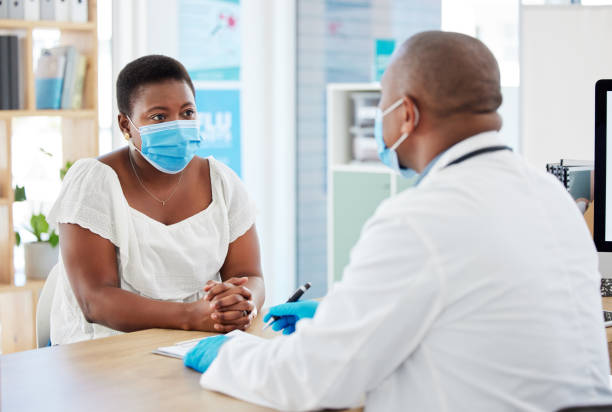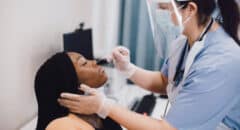
More than three years after the coronavirus began ravaging the planet, the World Health Organization announced that the pandemic is no longer a public emergency.
"It's with great hope that I declare COVID-19 over as a global health emergency. That does not mean COVID-19 is over as a global health threat," WHO Director-General Tedros Adhanom Ghebreyesus said during a news conference, adding he would not hesitate to reconvene experts to reassess the situation should COVID-19 again "put our world in peril," the Associated Press reported.
Since it began spreading, COVID-19 has killed at least 7 million people worldwide, according to the AP. As many as 20 million may actually have died, Tedros noted. Cases have continued to spike in parts of the world. Still, Tedros acknowledged that most countries have returned to more typical life, albeit with political divisions and poverty exacerbated by the spreading virus.
RELATED: The COVID ‘Emergency’ Is Over. Here’s What You Need to Know
What this means for the immunocompromised
For immunocompromised individuals who remain at high risk even after vaccination and previous infections, the end of the global health emergency doesn’t mean the end of COVID-19.
According to the CDC, examples of medical conditions or treatments that may result in moderate to severe immunocompromise include but are not limited to:
- Active treatment for solid tumor and hematologic malignancies
- Hematologic malignancies associated with poor responses to COVID-19 vaccines regardless of current treatment status (e.g., chronic lymphocytic leukemia, non-Hodgkin lymphoma, multiple myeloma, acute leukemia)
- Receipt of solid-organ transplant or an islet transplant and taking immunosuppressive therapy
- Receipt of chimeric antigen receptor (CAR)-T-cell therapy or hematopoietic stem cell transplant (within 2 years of transplantation or taking immunosuppressive therapy)
- Moderate or severe primary immunodeficiency (e.g., common variable immunodeficiency disease, severe combined immunodeficiency, DiGeorge syndrome, Wiskott-Aldrich syndrome)
- Advanced or untreated HIV infection (people with HIV and CD4 cell counts less than 200/mm3, history of an AIDS-defining illness without immune reconstitution, or clinical manifestations of symptomatic HIV)
- Active treatment with high-dose corticosteroids (i.e., 20 or more mg of prednisone or equivalent per day when administered for 2 or more weeks), alkylating agents, antimetabolites, transplant-related immunosuppressive drugs, cancer chemotherapeutic agents classified as severely immunosuppressive, tumor necrosis factor (TNF) blockers, and other biologic agents that are immunosuppressive or immunomodulatory
Many of the individuals that fall under these groups, and their loved ones, have continued practicing safety precautions and remaining isolated despite the rest of the world going back to normal.
“The most difficult part of prioritizing my health throughout COVID-19 has been seeing my friends and family get back to normal while I continue taking intense precautions,” LáDeia Joyce, a Type 2 diabetic who was diagnosed as HIV positive tells AstraZeneca. “I take pride in having set and exercised boundaries to put my well-being first, but I miss sharing new experiences without having to worry about COVID-19 exposure. As someone who is immunocompromised, staying healthy will always be my top priority, but I miss the people, places and activities that I love.”
Like many immunocompromised individuals, LaDeia wants to create new experiences with family and friends, but has a fear of exposing herself to COVID.
“While many Americans have moved on from the COVID-19 pandemic, the reality is that immunocompromised individuals simply do not have that luxury,” says Jorey Berry, President & CEO of the Immune Deficiency Foundation, one of AstraZeneca's advocacy partners who has collaborated with their Up The Antibodies since launch. “Together, we’re proud to continue advocating for the immunocompromised community so they feel supported navigating the path forward.”
Crystal King, who received a kidney transplant during the pandemic can relate. King, who has been battling chronic kidney disease since her teenage years, also hopes to be more comfortable someday to be able to join activities with family and friends.
“I watch friends experiencing all these ‘firsts’ with their children, and some of my favorite moments in life are creating those memories with my son. His little eyes widen each time we explore a new museum, visit the zoo or check out new books at the library. I’m hopeful that one day I’ll be able to create these memories with my son without having to worry about COVID-19 exposure and the implications that could have on my health,” King shares.
RELATED: Fighting COVID-19 with an Immunocompromising Condition: Tips for Staying Healthy
How to stay safe as an immunocompromised individual
Antibodies play an important role in fighting illnesses – including COVID-19. Unfortunately, for those that are considered immunocompromised and at the highest risk for developing severe COVID-19, their immune systems may not build the necessary antibodies needed to fight against infection.
For those that are immunocompromised like LaDeia and King, a vaccine alone will not provide an adequate response.
A recent study found that among US patients hospitalized with COVID-19, immunocompromised adults accounted for a disproportionately high percentage (12.2 percent) of hospitalizations compared with an estimated 2.7 percent of the US adult population.
The good news is that there are multiple tools that have been used against COVID-19 in vulnerable populations, including monoclonal antibodies. These antibodies are produced in a laboratory and can mimic or enhance the immune system's response, imitating the body’s normal infection-fighting abilities.
How are monoclonal antibodies used?
Monoclonal antibodies are used for diagnosis, disease treatment and research. They’re used:
- As probes to identify materials in laboratories or for use in home-testing kits like those for pregnancy or ovulation.
- To type tissue and blood for use in transplants.
- For diagnosis.
- For disease treatment.
What types of diseases do monoclonal antibodies treat?
Monoclonal antibodies have been used to treat the following conditions:
- Cancer.
- Organ transplant rejection.
- Inflammatory and autoimmune disorders, including allergies.
- Infections, including COVID-19.
- Osteoporosis.
- Eye conditions.
- Migraines.
- High cholesterol.
- Nervous system disorders.
If you have been diagnosed with a condition that monoclonal antibodies can treat, consult with your healthcare provider. He or she can help you determine whether or not this type of therapy may be suitable for you.
For more information on antibodies and preparing for what is ahead, visit Up the Antibodies.









